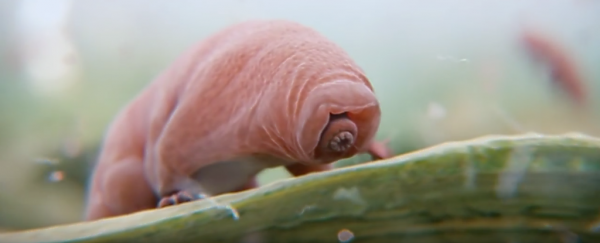Tardigrades - known affectionately as water bears or moss piglets - have pretty much got it all. These microscopic invertebrates are capable of surviving the most extreme conditions you could dream up, including prolonged desiccation and near-100 percent water loss, freezing and boiling temperatures, intense ionising radiation, and the vacuum of outer space.
Scientists have discovered that to survive extreme desiccation, tardigardes produce a special type of 'bioglass' to hold essential proteins and molecules together until they're rehydrated back to life. Now they're figuring out how to use this mechanism to develop drought-resistant crops and longer-lasting vaccines.
Back in September, researchers from the University of Chicago announced that they'd discovered a new type of glass - one produced internally by the tardigrade during desiccation. While they're yet to figure out exactly how the glass is formed, they concluded that it's produced as a protective mechanism to ensure that tardigrades can survive losing pretty much all of the water in their cells.
"When you remove the water, they very quickly coat themselves in large amounts of glassy molecules. That's how they stay in this state of suspended animation," lead researcher and molecular engineer, Juan de Pablo, said at the time.
Now researchers led by biologist Thomas Boothby from the University of North Carolina say they're one step closer to unravelling the secret of tardigrade bioglass.
Presenting at the annual meeting of the American Society for Cell Biology last week, Boothby and his colleagues announced that they've identified tardigrade-specific genes that code for specialised proteins called intrinsically disordered proteins (IDPs), which they say are responsible for the production of tardigrade glass.
Just like their name suggests, intrinsically disordered proteins are shapeless and highly flexible under normal conditions, but when extreme drying occurs, the production of these proteins is kicked up a notch, and they rearrange themselves into solid biological glasses.
These newly formed IDP glass structures target specific proteins, molecules, and other essential cell parts when the tardigrade starts losing water, and enclose them in stiff, protective envelopes so they don't fall apart during the desiccation process. When the tardigrade is exposed to water once more, the glass melts and the IDPs return to their floppy, random state.
Boothby and his colleagues tested this unique survival mechanism by engineering tardigrades with lower levels of IDPs. They found that while these tardigrades were less able to withstand desiccation, they remained unaffected by other stresses such as extreme cold. "Interestingly, these genes do not appear to be essential for general survival or for surviving other stresses," they report.
This suggests that the creatures have different mechanisms to survive different types of extreme stress.
They then tested the IDPs by expressing them in human epithelial cells (HeLa):
"[W]e found that when expressed in HeLa cells, desiccation induced a relocalisation of these IDPs, which under hydrated conditions appeared diffuse throughout cells' cytoplasm, to specific cytoplasmic organelles - suggesting that individual proteins are targeted to different parts of cells, perhaps protecting specific cellular compartments. We found in vitro these proteins formed biological glasses when dried."
The team engineered yeast and bacteria to produce tardigrade glass proteins, and found that when put under extremely dry conditions, they were better able to survive the desiccation process. This could be the key to engineering drought-resistant crops.
Another application for IDPs is medicine. Boothby and his colleagues say they could protect certain enzymes from drying out, and can seriously cut the cost of storing vaccines. "[A]round 80 percent of the costs of vaccination programs in developing countries comes from having to keep vaccines cold," they report.
As Tina Hesman Saey at Science News explains, the researchers have shown that tardigrade glass can also protect enzymes from drying out in experiments:
"The enzyme [lactate dehydrogenase] loses its activity when dried out. But when the researchers mixed the enzyme with the glass proteins before drying, the enzyme bounced back to normal activity when rehydrated. Mixing in water bear proteins after drying didn't help, indicating that the glass proteins need to encase other molecules to protect them."
Just like the similarly resiliant naked mole rats, which have become invaluable to cancer researchers in recent years, figuring out the secrets of water bear survival could be huge. And something tells me tardigrade glass is just the beginning.
